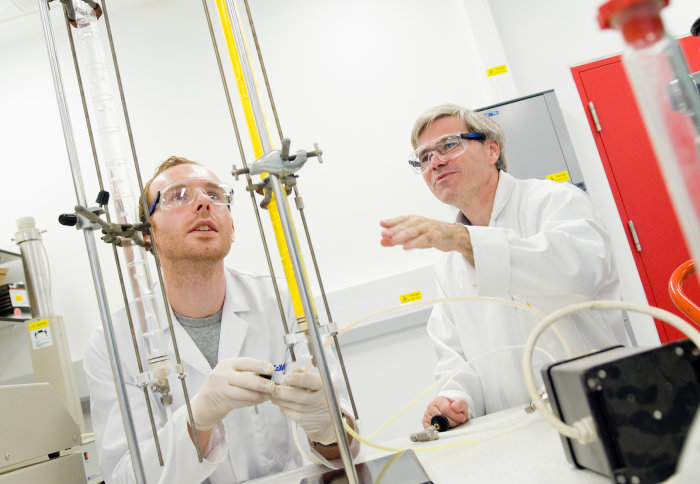Imperial academics named Fellows of the Royal Academy of Engineering

Professor Martin Blunt (R) demonstrating carbon capture
Four eminent Imperial academics have been elected as Fellows of the Royal Academy of Engineering.
The new Fellows include Imperial College London’s President, Professor Alice Gast; Head of the School of Design Engineering, Professor Peter Childs; leading expert in petroleum engineering, Professor Martin Blunt; and human-robotic interaction expert Professor Maja Pantic.
Becoming a Fellow of the Royal Academy of Engineering is one of the highest honours that an engineer can receive in the UK. The Imperial Fellows join 54 engineers from around the world who were elected this year in recognition of their outstanding and continuing contributions to the profession.
The announcement brings the total number of Imperial Fellows at the Academy to 91.
Professor Nigel Brandon, Dean of the Faculty of Engineering, said: “I am delighted to see Alice, Martin. Maja and Peter recognised by the Royal Academy of Engineering.
"They are outstanding engineers who are making a real difference in the world through their research, teaching and leadership, and on behalf of all my colleagues in the Faculty of Engineering I would like to congratulate them on this great achievement.”
Complex fluids
 Professor Alice Gast, President of Imperial, is one of the world’s foremost chemical engineers and academic leaders.
Professor Alice Gast, President of Imperial, is one of the world’s foremost chemical engineers and academic leaders.
Her academic interest is in surface and interfacial phenomena, in particular the behaviour of complex fluids. She has co-authored numerous scientific publications and a classic textbook on colloid and surface phenomena.
As well as her academic achievements, Profess Gast is a well-known and influential voice on innovation, collaboration, globalisation, technology and the future of higher education.
Professor Gast said: “It is truly an honour to become a Fellow of the Royal Academy of Engineering. Imperial College London shares the Academy’s worthy ambition to advance and promote excellence in engineering for the benefit of society. I am proud to join such an esteemed community of inspiring engineers, including many talented Imperial colleagues.”
Creativity in design
 Professor Peter Childs is the Founding Head of the Dyson School of Design Engineering at Imperial, which offers degrees founded on the development of mathematics and analysis, form and aesthetics, and philosophy and rationale.
Professor Peter Childs is the Founding Head of the Dyson School of Design Engineering at Imperial, which offers degrees founded on the development of mathematics and analysis, form and aesthetics, and philosophy and rationale.
Professor Childs pitched the idea to entrepreneur James Dyson in 2013, and was successful in attracting the Dyson Foundation to be Imperial's partner in setting up the School.
He is also professor at large for the Innovation Design Engineering double master’s degree at the Royal College of Art and Imperial and holds active roles with companies including Q-Bot Ltd and Strategy Foresight.
He said: "I am passionate about responsible business and diversity in education, and I look forward to working with the RAE to see what can be done to further enhance both responsibility and diversity within the sector."
Going with the flow
 Professor Martin Blunt is Chair in Petroleum Engineering in the Department of Earth Science and Engineering. His research investigates the flow of liquids and gases through porous media, particularly how oil and gas flow through the spaces within rocks.
Professor Martin Blunt is Chair in Petroleum Engineering in the Department of Earth Science and Engineering. His research investigates the flow of liquids and gases through porous media, particularly how oil and gas flow through the spaces within rocks.
This has applications in extracting oil and gas, using rocks to store carbon dioxide and for clean-up of polluted underground water sources, as well as less obvious areas such as how termites keep their nests cool.
Professor Blunt said: "I am honoured and delighted to be elected as a Fellow of the Royal Academy of Engineering. This would not have been possible without the hard work and dedication of the many talented students and colleagues with whom I have had the privilege to work during my 20 years at Imperial.
"The ability to use X-rays to see inside rocks and other porous materials has transformed our understanding of how fluids flow deep underground with application to many societally important problems, including carbon dioxide storage to mitigate climate change, and the wise use of water resources, as well as improved hydrocarbon recovery."
Human-robot interactions
 Professor Maja Pantic a Professor of Affective and Behavioural Computing at Imperial and Research Director of the Samsung AI Centre in Cambridge.
Professor Maja Pantic a Professor of Affective and Behavioural Computing at Imperial and Research Director of the Samsung AI Centre in Cambridge.
Her work focuses on nonverbal human behaviour and how it can be applied to improving human-computer, human-robot, and computer-mediated human-human interactions. These include machine analysis of facial expressions, machine analysis of human body gestures, audiovisual analysis of emotions and social signals, and human-centred machine interfaces.
Creative and inspiring engineers
Professor Dame Ann Dowling, President of the Royal Academy of Engineering, said: “Our Fellows are at the heart of all Academy activities and I am delighted to welcome these highly successful, creative and inspiring engineering leaders to the Fellowship.
“There has never been a more important time for the Academy to advance and promote excellence in engineering so that the engineering profession can continue to contribute to societal wellbeing and economic growth.”
Article text (excluding photos or graphics) © Imperial College London.
Photos and graphics subject to third party copyright used with permission or © Imperial College London.
Reporter
Hayley Dunning
Communications Division
Deborah Evanson
Communications Division